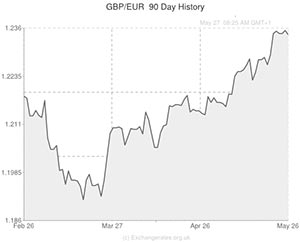
The Pound to Euro exchange rate (GBP/EUR) remained close to 17-month highs during yesterday’s Bank Holiday session as investors reacted to dovish comments from European Central Bank President Mario Draghi.
With unemployment rife and price pressures receding across the currency bloc there is a lot of heat on policymakers at the ECB, with investors expecting them to provide the region with further stimulus. Draghi told reporters in Portugal on Monday that the ECB is ready to act to prevent deflation from kicking in:
“What we need to be particularly watchful for at the moment is, in my view, the potential for a negative spiral to take hold between low inflation, falling inflation expectations and credit”.
The ECB President said that conventional monetary policy tools – such as reductions to the benchmark interest rate and the deposit rate – were being considered and mentioned that non-standard measures – such as a QE-style bond-buying programme – could be implemented if new inflation projection data points towards a prolonged period of below-target CPI.
The consumer price index is currently running at 0.7%, far below the bank’s target of 2.0%. It is difficult to predict how quickly any potential monetary easing measures could make an impact on the rate of inflation and as such it is possible that the ECB could look to introduce a strong package in June to help spur price pressures.
If the ECB’s “pre-emptive action” involves a triple-threat of reducing interest rates, bringing the deposit rate down into negative territory and purchasing Eurozone bonds then it is possible that demand for the single currency could weaken further and GBP/EUR could rally towards 1.2500.
BoE hiking cycle
Over the weekend the divergence in central bank rate outlooks was highlighted by comments from Bank of England Deputy Governor Charlie Bean. In stark contrast to Mario Draghi’s strong hints towards monetary loosening, Bean said that UK interest rates would hit 3.00% over the next few years and suggested that there was a case for hiking rates ahead of the current schedule:
“There’s a case for moving gradually because we won’t be quite certain about the impact of tightening the bank rate, given everything that has happened to the economy. You need to start taking those baby steps a bit earlier, otherwise you end up being behind the curve”.
His upbeat remarks echoed sections from the latest BoE minutes report, which showed that some policymakers are beginning to consider the benefits of hiking rates sooner rather than later.
If this trend continues and more members of the Monetary Policy Committee become outspoken on the need to start a hiking rates before Q2 2015 then it will likely give the Sterling to Euro exchange rate (GBP/EUR) a significant boost.

Comments are closed.